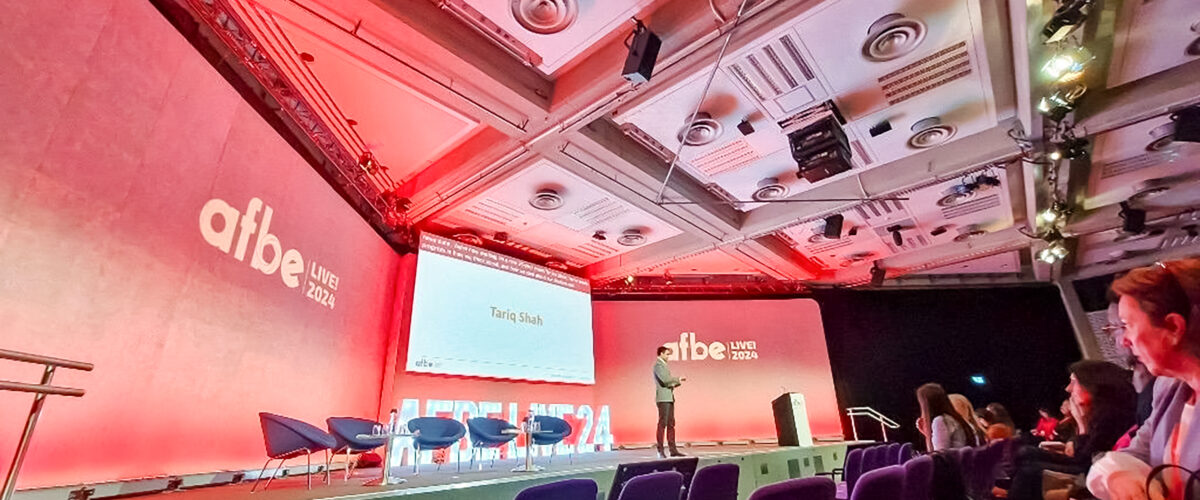The principles of inclusive design
Vigo Group Chief Executive Tariq Shah OBE accepted an invitation to be a guest speaker at a major industry event recently.
AFBE Live, which took place in The Queen Elizabeth II Centre in London, sees industry experts get together to highlight current technological issues and showcase the power of engineering and technology to solve today’s most complex and challenging problems.
Tariq spoke about the critical topic of equity within the built environment, focusing specifically on the principles of inclusive design, and shed light on the importance of creating spaces and structures that cater to the diverse needs of all individuals, promoting accessibility, inclusivity, and equity.

Here, Tariq gives us an insight into why he feels this topic is so important:
While the UK continues to move forward in many ways, there are communities and places which have been left behind. Politicians talk of ‘levelling up’, reducing disparities between and within areas, but many in society still don’t have the opportunities that others do and feel they are being left behind. And they are. We need to not only create opportunities, but communicate them, and enable people to take advantage of them.
Social equity, in this context, exists when our built environment supports improved wellbeing and quality of life. But this isn’t just a social problem – our businesses and organisations don’t operate in a vacuum. Our business, Vigo Group, is a family business, and so we see more directly the impact that our decisions today have on societal outcomes in future generations.
Bringing about change in Doncaster
At ABFE, I spoke about my home city of Doncaster as an example, how it has long suffered from ‘brain drain’, with young people leaving to study elsewhere, and seldom returning. For me, it was different; I had a family business to which to return. On returning home from university in 2006, it was to a place that had a dysfunctional public-private relationship and institutions that simply didn’t work. Interventions from Government, mismanagement, adversarial politics, lurches into populism, were all features of the local scene.
So, I sought out positive individuals who wanted to see change. We engaged openly and built trust. We set up a place marketing board and agreed shared goals across sectors. Eventually, as engagement grew and we adapted our business’s investment plans to sit alongside plans for change, that change in the place started to materialise.
A blueprint for success
In Doncaster, alongside local partners, we’ve supported a range of funding bids, investment pitches, and the development of vision by providing time, advice, and guidance. Successes have included the successful bid for City Status, the Towns Fund bid for £25 million, and through the City Board we’re now working with partners on the 25-year vision for our place.
Doncaster has moved forwards, with major new investments including becoming home to innovative aircraft manufacturing, the Yorkshire Wildlife Park, new civic buildings, and very quietly nurturing home-grown globally significant AI and technology businesses.
We’ve made progress in how we think about, and care for, our children and young people; we are more innovative in public service delivery and the scale of our ambition has grown significantly. I believe the policies we have put in place, and the strides forward we have made in Doncaster, can be duplicated anywhere.
Point of Inflection
Some are calling this ‘the decisive decade’, an inflection point of growing instability. Communities and traditional institutions seem unable to understand what shapes the future, and in what nuanced ways the future will be different for their community and place than for others. I don’t believe we are equipped to comprehend how to prepare for a world of AI, future pandemics, climate change, conflict, and other systemic risks. The world is becoming more complex, but at the same time society is consuming information in an increasingly bitesize manner. In the face of increased complexity, we face challenges around ensuring trustworthy information. In times of increasing complexity, research demonstrates that cognitive diversity produces better results.
A call to action
To tackle this, we need to bring together a more diverse range of people, those who think differently and have different experiences; those whose skills lend themselves to understanding future challenges, and who understand the experience of people in their place. Through diversity we can begin to understand how the challenges we face as a society affect individuals from a range of backgrounds, and we can develop better solutions which impact more positively everyone in our communities.
Many people can identify a problem, but not everyone is able to do anything about it. Being in a room with peers at AFBE Live brought home to me that, together, we have the skills to solve these problems, along with the drive and experience to create change in the places where we live and work.